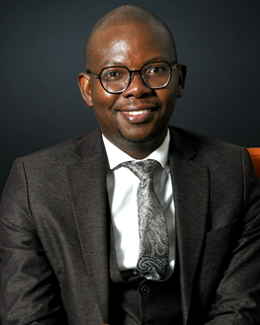

The Department of Linguistics and Modern Languages houses the disciplines of Applied Linguistics, French, General Linguistics, Mandarin, Portuguese and Translation Studies. Linguistics, the study of language, tries to answer questions such as what all languages have in common, how languages differ from one another, what kind of varieties occur within a single language, how written and spoken forms of language differ, how children acquire language, why languages change and whether differences among groups in society are reflected in their language.

Dr. Napjadi Letsoalo
Chair, Department of Linguistics and
Modern Languages
Welcome to the Department of Linguistics and Modern Languages! A department aiming for a future defined by academic excellence, innovation, and inclusivity.
In our pursuit of excellence, it is imperative that we align our departmental offerings with a transformative agenda that reflects the dynamic and diverse nature of our society. The vision held for our department is one where we redefine linguistic and language studies through a curriculum that is decolonised and centers African epistemology. We aim to embrace and foreground African knowledge systems, philosophies, and languages, ensuring that our students are not only well-versed in global linguistic paradigms but also deeply rooted in the rich linguistic heritage of our continent.
Decolonising the curriculum involves critically engaging with and dismantling the lingering colonial frameworks that have historically marginalized African perspectives. This process will involve rethinking our course content, pedagogical approaches, and research priorities to foreground African voices and methodologies. We will strive to create a curriculum that not only acknowledges but celebrates the diversity of African languages and the unique cultural insights they offer.
Central to this transformative vision is the use of indigenous languages in teaching and learning. Indigenous languages are not merely tools of communication but are carriers of culture, identity, and knowledge. Integrating these languages into our educational framework will enhance our students' learning experiences and foster a deeper connection to their heritage. We will work towards creating a multilingual academic environment where languages such as isiZulu, Sepedi, Xitsonga, and others are actively used in teaching, research, and community engagement. This approach will not only enrich our students' linguistic competence but also affirm the value of their cultural identities.
In the realm of research, we will prioritize projects that explore and elevate indigenous languages and their applications in various fields. By focusing on areas such as language preservation, computational linguistics for African languages, and the sociolinguistic dynamics of multilingualism in African contexts, we aim to position our department at the forefront of linguistic research that has tangible societal impact. Collaborative research with local communities will be encouraged, ensuring that our scholarly endeavors contribute to the empowerment and development of those we study.
Technology, too, plays a crucial role in our vision for the department. The advent of digital tools and resources offers unprecedented opportunities for the study and promotion of languages. We will harness these technologies to enhance our teaching methodologies, facilitate innovative research, and expand access to linguistic resources. This includes developing online platforms for language learning, utilizing digital corpora for linguistic analysis, and exploring the potential of artificial intelligence in language processing. We will not only modernize our approach but also ensure that our students are prepared for the evolving landscape of linguistic research and application.
As we embark on this transformative journey, community engagement will remain a cornerstone of our mission. Our department will actively seek partnerships with local organizations, government agencies, and indigenous communities. These collaborations will provide our students with valuable opportunities to apply their linguistic skills in real-world contexts, promote cultural diversity, and contribute to community development. Through bridging the gap between academia and society, we aim to create a lasting impact that extends beyond the confines of our university.
In conclusion, the Department of Linguistics and Modern Languages at Unisa stands at the threshold of an exciting era. We will pursue a path of academic rigor, innovation, and inclusivity, driven by a commitment to decolonization, the promotion of indigenous languages, and the integration of technology. Together, we will cultivate a vibrant academic community that not only excels in linguistic education and research but also contributes meaningfully to the cultural and intellectual landscape of Africa and the world.